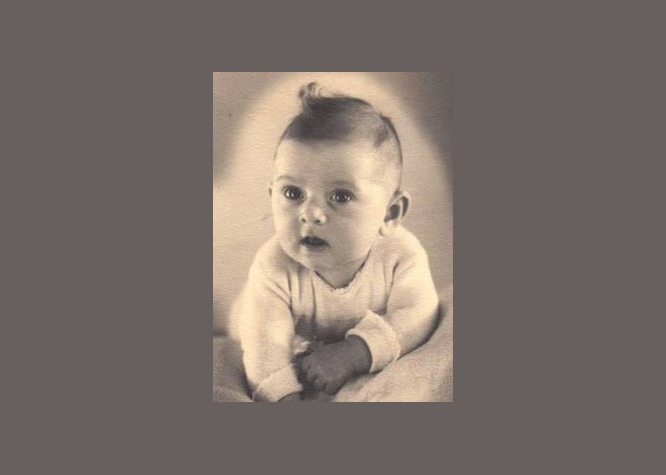Look into the eyes of the child in the photograph. Her name was Alida Baruch, and she was a Dutch Jew. Born on January 26th, 1942, in Amsterdam, she was murdered in the gas chambers in Auschwitz after selection in July 1942.
Every day, the Auschwitz Museum puts up photographs of victims of the Shoah on its Twitter account. Every day, I retweet one, so that I always remember where man’s inhumanity to man can lead. Every day there is another life to reflect on, sometimes a solemn little boy, captured in his best suit, a laughing girl, a kind-faced woman, bent with toil, an elderly man, gaunt and terrified. Yesterday it was Alida, who would have reached her 79th birthday in January this year. Who knows what strength, what love, what beauty she would have brought into the world over her years, had she lived?
For the sake of this child, and every child, we cannot falter in calling every government to account, in fighting for justice and equality, in rightful anger and strong action against the forces that see this child as unworthy of life.
This child, Alida, her eyes curious, aware, full of light, this child, her potential snuffed out like a candle, is every child who has died because of hatred.
This child died because a society allowed itself to descend to greater and greater cruelties, because people believed politicians who promised them that the answer to their hatred was to kill its objects, because people willingly shut their eyes to where their government was leading them when its policies pandered to their prejudices.
This child is the broken body tossed onto a Channel shore after falling from a broken boat. This child shivers in a camp in America, separated from her parents. This child starves in Darfur, sickens in Yemen, is beaten by guards in Nauru.
For the sake of this child, and every child, we cannot falter in calling every government to account, in fighting for justice and equality, in rightful anger and strong action against the forces that see this child as unworthy of life.
It matters not that individually we are small, and our power is limited, that we are heartsore and poor and weary and sick. All that matters is that in our small way, we do not choose to do nothing, we do not choose to be silent, we do not choose to look away.
Because it is a choice. It is always a choice. Poor and weary, sick and heartsore though we be, all it takes for evil to triumph is for the good to choose to do nothing.
Remember this child. She is every child. She is our child.
We fight so that the atrocity which took this child’s life will never rise to take other lives again.
Photo credit Auschwitz Museum


How about a rememberance for all the Gypsies, Russian, Serbs, Poles etc etc. They were treated with equal cruelty and inhumanity. They were exterminated in equal if not greater numbers and their lives are no less worthy of rememberance. I am not anti semitic, indeed I have some Jewish blood in my veins but it galls me to see how they seem to have ‘cornered the market’ in martyrdom. How about a piece on them?
I agree with you that the Roma and Sinti are often forgotten – the racism against them in this country, is also often ignored – and certainly the immense sacrifices of the Russians and the Poles and Serbs also often fly under the radar. Millions of them died too, both as combatants and civilians. My piece was specifically about the Jews, but I recognise the suffering of other groups and will be happy to make them the subject of a historical piece as soon as I can. The holocaust of the Jews is specifically focused upon in dicussions of the killing camps and the concentration camps because, I believe, of its origins in the very long history of anti-Semitism in Europe (and in England too: witness the mediaeval story of Little St Hugh, and the “blood libel”) as well as Hitler’s specific and personal hatred of them as documented in “Mein Kampf.” As an “outgroup” they were an easy target, as are travelling peoples of all backgrounds. The “anti-slavism” of Germany is less well recognised.